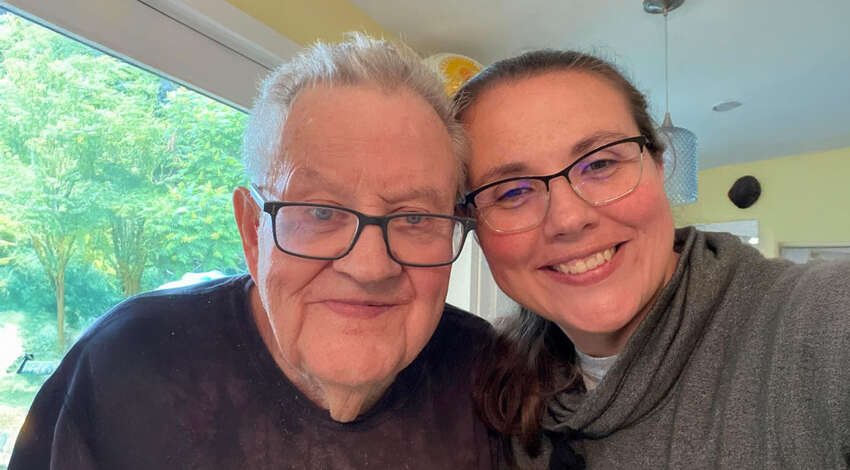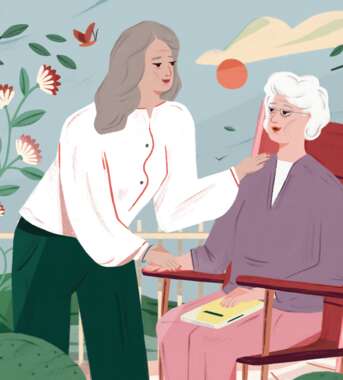Caregiving is Lonely: Let’s Find Connection!
- Caregiving often leads to profound loneliness and isolation, a problem reaching epidemic proportions in the U.S.
- Caregivers frequently struggle with difficult decisions and feel misunderstood, often hesitating to share their challenging experiences with others.
- The author's personal journey highlights the consuming nature of caregiving, including the emotional toll of making tough choices for a loved one with dementia.
- Road Scholar offers vital resources like Caregiver Grants, free Age Well online lectures and a dedicated Facebook group to help caregivers find connection, education and respite.

There’s a loneliness problem in the United States that’s reached epidemic proportions. In 2023, the U.S. Surgeon General released a report that 51% of Americans had reported feeling lonely or isolated since the pandemic. That’s an astounding number — but as caregivers, I think hardly any of us are surprised.
It’s Lonely Being a Caregiver
As more and more Americans are taking on a caregiving role for a loved one, it makes complete sense that a larger percent of our population is feeling alone. The role of a caregiver is a consuming one, and often your world begins to revolve around the needs of the person in your care.
As a caregiver for my dad, I faced some extremely lonely times in doctors’ offices waiting for myriad tests to be done, or while I sat with him after he was admitted to the hospital (many, many times) and sat while he fell asleep. Though I didn’t live with my parents, there were weeks when I was at their apartment every evening trying to help with groceries, cleaning or looking after Dad — after working all day. My social life dwindled, and while friends or family might text to check in, it wasn’t quite the same.
I Didn’t Want to Be a Downer
If I’m going to be honest, I also wasn’t reaching out to people like I could have — I felt like my conversation material was fairly depressing. As friends or family might talk about their fun weekend, a movie they saw or a trip they took with their kids, my topics of conversation revolved more around my dad’s current medications and the doctor’s appointments we needed to get through. I felt like a total downer, and I didn’t want to put that burden on other people.
Decision Making Can Be Tough
I think my loneliness peaked, however, during times when I had to make really difficult decisions. Towards the end of his life, my dad had dementia on top of his other physical ailments, and he generally didn’t understand why he now needed to do things that were out of his normal routine. Making decisions for him was incredibly tough, and I often wondered if I was doing the right thing. Is this what he wants? Will this make him feel better? Is there a better way to do this?
No One Gets What I’m Going Through
I don’t have siblings, and my mum was extremely overwhelmed during Dad’s last few months. Ultimately, I was on my own to handle some very complicated situations and it often felt like no one understood what I was going through. I ran through a gamut of emotions on a daily basis — fear, exhaustion, confusion, anger, guilt, sadness (just to name a few.)
Finding Connection
It wasn’t until I had a conversation with some coworkers here at Road Scholar that I started to hear that many others were quietly taking care of their parents as well. And surprisingly, that somehow helped. To know that others saw the place I was at in my life, and to know they were on a similar journey was comforting. I wasn’t the only person going through this. And we were all just trying to find our way.
Road Scholar has long understood the significance of caregiving in the lives of our community members. As an organization, we created Caregiver Grants in 2015 as a way to help participants find some opportunity to get away and experience some respite during — or after — their caregiving journeys. We have now added to this movement our new Age Well online lectures, free one-hour sessions you can attend from the comfort of your own home that delve into topics like dementia, aging in place and much more.
Most recently, we’ve also created a Caregivers Facebook group where caregivers over the age of 40 can join to talk about our current challenges, ask for advice or simply show up to feel some human connection. I have been amazed at the support and vulnerability that people have shown in this group — and I’d like to think it has helped some of our community members feel like they are not alone.
Your time as a caregiver is often at a premium. But if you need to reach out, are looking for education or ultimately need some respite for yourself, I hope you’ll consider these resources from Road Scholar. Together, we are not alone!


